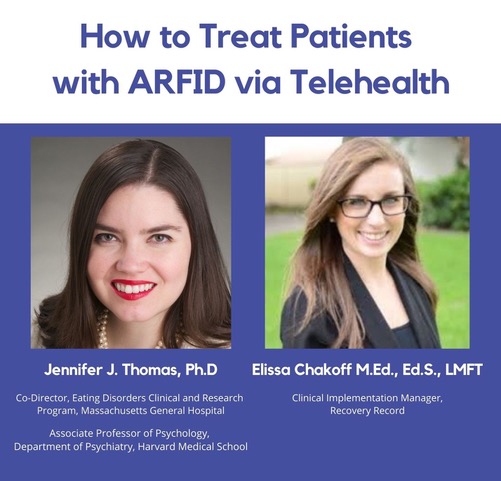iaedp™ Institute Webinar “How to Treat Patients with ARFID via Telehealth” by Dr. Jennifer Thomas and Elissa Chakoff LMFT
iaedp Institute Continuing Education Webinar Series
FEBRUARY 10, 2021 10:00am/PST-1:00pm/EST – 1 hour webinar
*Recording no longer available.
Avoidant/Restrictive Food Intake Disorder (ARFID) afflicts those who cannot meet their nutritional needs due to sensory sensitivity, fear of aversive consequences, or lack of interest in eating. With minimal evidence-based treatments available, and a pandemic limiting access to in person care, providers are seeking practical, foundational training on how to treat ARFID patients via telehealth.
This timely webinar will provide a specialized introduction to a new form of cognitive-behavioral therapy for ARFID (CBT-AR) that has been developed and refined at Massachusetts General Hospital for patients ages 10 through older adults. Early data from an efficacy study indicate that, on average, patients who receive CBT-AR incorporate many novel foods into their regular diets, gain significant weight (if underweight), and significantly reduce both ARFID symptom severity and food neophobia. The presentation will cover the assessment of ARFID, the implementation of all four stages of treatment, and clinical, technical and safety considerations when delivering this treatment via telehealth. Finally, opportunities for leveraging digital tools to augment and enrich CBT-AR will be discussed.
Presenters:
Dr. Jennifer Thomas is Co-Director of the Eating Disorders Clinical and Research Program at the Massachusetts General Hospital and an Associate Professor of Psychology in the Department of Psychiatry at Harvard Medical School. Along with her colleague, Dr. Kamryn Eddy, she has developed the new cognitive behavioral treatment for ARFID that will be described in this webinar. Dr. Thomas’s scientific research focuses on the neurobiology and treatment of feeding and eating disorders and has been funded by the National Institute of Mental Health (NIMH) and private foundations. She is currently mPI on an NIMH-funded study on the neurobiology of avoidant/restrictive food intake disorder (ARFID). Dr. Thomas’s books Almost Anorexic: Is My or My Loved One’s Relationship with Food a Problem? and Cognitive-Behavioral Therapy for Avoidant/Restrictive Food Intake Disorder: Children, Adolescents, and Adults, as well as her >120 peer-reviewed articles and book chapters, describe the many forms of disordered eating that are not fully captured by current psychiatric definitions. Dr. Thomas is also Secretary of the Academy for Eating Disorders and an Associate Editor of the International Journal of Eating Disorders.
Elissa Chakoff is the Clinical Implementation Manager at Recovery Record. In this role she trains specialist eating disorder practitioners in the implementation of digital therapeutics, develops clinical best practices for their use, and oversees the review of clinical capabilities in the Recovery Record mobile applications. Elissa is a Licensed Marriage and Family Therapist and Qualified Clinical Supervisor, currently working towards her PhD in Counseling. She has clinical and managerial experience working at the residential, PHP, IOP and outpatient levels of care, specializing in the treatment of eating disorders, PTSD and family counseling.
References
Thomas JJ, Becker KR, Kuhnle MC, Jo JH, Harshman SG, Wons OB, Keshishian AC, Hauser K, Breithaupt L, Liebman RE, Misra M, Wilhelm S, Lawson EA, Eddy KT. Cognitive-behavioral therapy for avoidant/restrictive food intake disorder: Feasibility, acceptability, and proof-of-concept for children and adolescents. Int J Eat Disord. 2020; 53: 1636–1646.
Thomas JJ, Becker KR, Breithaupt L, Murray HB, Jo JH, Kuhnle MC, Dreier MJ, Harshman S, Kahn DL, Hauser K, Slattery M, Misra M, Lawson EA, Eddy KT. Cognitive-behavioral therapy for adults with avoidant/restrictive food intake disorder. Journal of Behavioral and Cognitive Therapy, in press.
Thomas JJ, Eddy KT. Cognitive-Behavioral Therapy for Avoidant/Restrictive Food Intake Disorder: Children, Adolescents, and Adults. Cambridge, UK: Cambridge University Press; 2019.
Behaviorally measurable learning objectives:
Learning Objectives:
- Discuss how to confer a diagnosis of ARFID based on DSM-5 criteria and describe the assessments (e.g., interviews, self-report questionnaires) that can be used to assess severity.
- Describe the type of patients with ARFID for whom cognitive-behavioral therapy is appropriate.
- Describe the basic structure, goals, and session format of cognitive-behavioral therapy for avoidant/restrictive food intake disorder (CBT-AR).
- Discuss current challenges associated with the delivery of CBT-AR via tele health and how digital tools can be used to address some of these challenges.
Proudly presented by iaedp™ Organizational Member Recovery Record.






